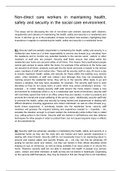Non-direct care workers in maintaining health,
safety and security in the social care environment.
This essay will be discussing the role of non-direct care workers (security staff, cleaners,
receptionists and caterers) in maintaining the health, safety and security in a residential care
home. It will then go on to the evaluation of these non-direct care workers, highlighting their
importance in regards to maintaining the health, safety and security in a residential home.
M3: Security staff are partially responsible in maintaining the health, safety and security in a
residential care home as it is their responsibility to remove any threats (e.g. intruders) from
the residence and to monitor any potential hazards to the service users’, visitors’ or other
members of staff who are present. Security staff firstly ensure that areas within the
residential care home are secured safely at all times. This means that unauthorised people
cannot gain access to areas within the home, for example if the entrance to the home was
not secured at all times, anybody could get into the home and pose a hazard to the service
users, members of staff and visitors also. There will be security staff on duty 24 hours a day
to ensure maximum health, safety and security for those within the building (e.g. service
users’, other members of staff and visitors’) and although they may not necessarily be
roaming around the residential home, they will be in the security office ready to go and
resolve a situation that may have escalated, for example. The security staff have to work
discretely so they do not cause worry or panic which may cause somebody’s anxiety – for
example – to rocket. Seeing security staff walk around the home doesn’t create a nice
environment for everybody within it, so in a residential care home environment, security staff
will most likely spend their time in an office unless they are needed, in order to preserve and
promote the mental and social wellbeing of the service users’. Additionally, security staff help
to promote the health, safety and security by being trained and experienced in dealing with
difficult situations including aggressive and violent individuals’ as well as other threats (e.g.
bomb threat suspicions). If somebody breaks into the residential home, security staff
members will possess the required training and experience needed to – hopefully – de-
escalate the situation enough to at least restrain the individual(s) while further help is called
(e.g. calling police to the home). Security staff are trained in self-defence and also defence
techniques for other people in order to protect them, but not cause long-term injury or effects
on the perpetrator(s).
D2: Security staff are extremely valuable in maintaining the health, safety and security in a
residential home as they are the ones who are trained and have specific experience in
dealing with direct threats. Security staff do not necessarily have to be wandering about to
prevent and resolve safety and security threats, as – not only can this be extremely off
putting for service users’ and visitors’, but they can remain in their offices discretely whilst
keeping an eye on entrances, as well as being available if an issue arises in or around the
home. However, security staff are not able to maintain the health of people (e.g. service
users’, visitors’ and other members’ of staff) as they are not trained in healthcare. Depending
on the security staff themselves, they may be trained in first aid, though this is not mandatory




